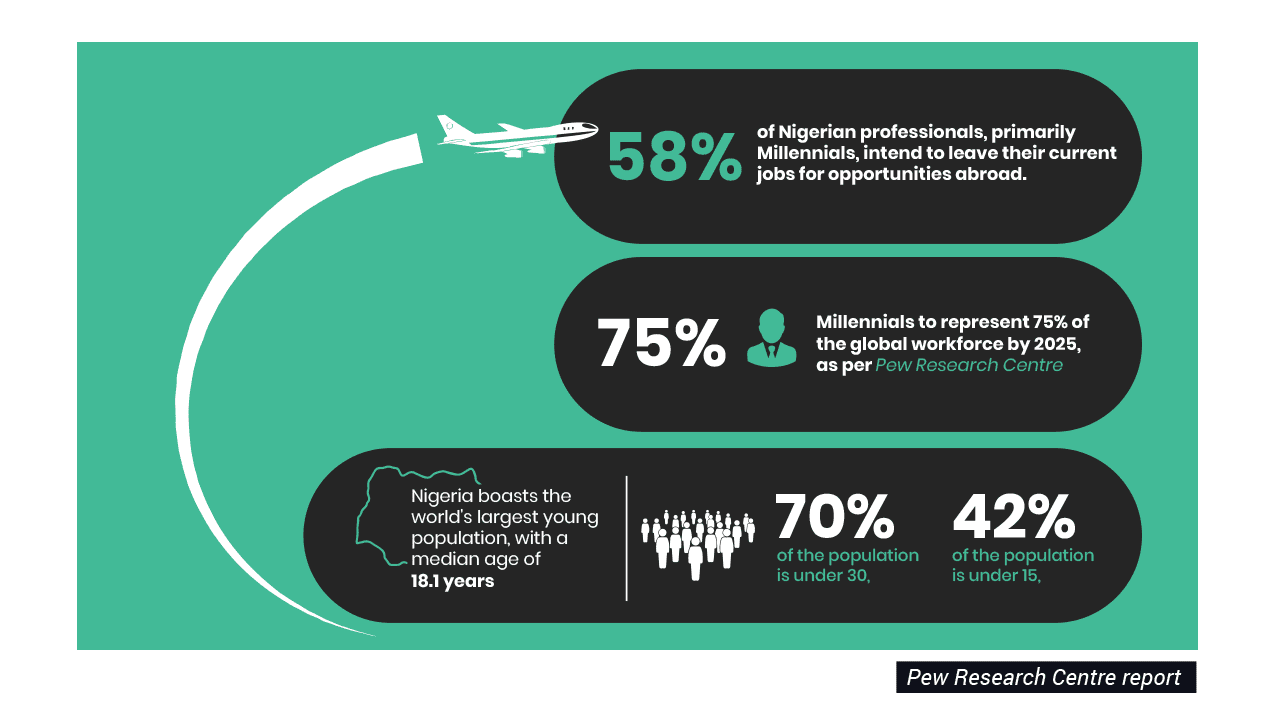In today’s era of globalisation and rapid technological progress, the concepts of “brain drain” and “brain gain” hold paramount importance for countries worldwide, including Nigeria. Brain drain signifies the emigration of highly skilled individuals seeking better opportunities abroad, while brain gain involves skilled individuals returning to their home country or foreign talent opting to work there. In this article, we delve into the issue of brain drain and brain gain in Nigeria, exploring their substantial impacts on the economy, workforce, and innovation landscape.
The Reality of Brain Drain in Nigeria
Nigeria grapples with the persistent challenge of brain drain, which has a complex economic impact. A recent report by Phillips Consulting Limited (pcl.) on brain drain revealed that 58% of Nigerian professionals, primarily Millennials, intend to leave their current jobs for opportunities abroad. Millennials currently dominate the workforce and are projected to represent 75% of the global workforce by 2025, as per Pew Research Centre.
Nigeria boasts the world’s largest young population, with a median age of 18.1 years; roughly 70% of the population is under 30, and 42% is under 15, according to a Pew Research Centre report. With this substantial presence of highly skilled millennial professionals, their departure from Nigeria can significantly impact crucial sectors and the overall economy.
Understanding the Causes and Consequences of Brain Drain
Several factors influence Nigeria’s brain drain. Economic instability, poor infrastructure, and political unpredictability have damaged confidence in the country’s future. Professionals are further discouraged from remaining or coming back because there are few opportunities for career advancement and a frequently onerous bureaucracy. Not only does brain drain remove talent from Nigeria, but it also depletes its human capital, inhibiting innovation and economic growth.
The consequences of brain drain in Nigeria are multidimensional. First and foremost, it creates a scarcity of skilled workers in vital sectors, hampering the country’s ability to provide quality healthcare, education, and infrastructure development. This scarcity can also drive up wages, making it harder for local businesses to compete and thrive. Furthermore, the loss of skilled workers directly impacts research and innovation, impeding the country’s ability to tackle complex challenges.
The Beacon of Hope: Brain Gain
While the challenges posed by brain drain are significant, Nigeria is also experiencing a notable brain gain. As the country’s economy grows and opportunities expand, some diasporas return home, bringing valuable expertise and international exposure. This reverse migration has the potential to inject fresh talent into the workforce and stimulate innovation.
Nigerian organisations and the government must adopt strategic approaches to maximise brain gain and minimise brain drain. First, investment in education and skills development is paramount. Providing opportunities for professional growth and advancement can dissuade talented individuals from leaving. Streamlining bureaucratic processes, enhancing infrastructure, and improving the business climate can make Nigeria more attractive to returning diaspora members and foreign talent.
The Role of HR in Nurturing Brain Gain
Human resources (HR) professionals have a pivotal role to play in fostering brain gain. They can create inclusive workplaces that value diversity, making it easier for returning diaspora members to reintegrate into the workforce. HR departments can also initiate mentorship programs to help newcomers navigate the local job market and connect with the broader professional community. Furthermore, HR can work closely with government bodies to advocate for policies that support talent attraction and retention.
Nigeria’s Innovation Potentials
Brain gain in Nigeria has a profound impact on its innovation landscape. The influx of skilled professionals returning from the growing diaspora network positions the country as a potential hub for innovation and entrepreneurship. The success stories of Nigerian tech startups, such as Flutterwave and Paystack, underscore this potential.
As more skilled individuals return or opt to work in Nigeria, they bring diverse experiences and knowledge acquired from advanced economies. This diversity of thought fosters innovation, empowering local companies to create cutting-edge solutions and products. Additionally, a vibrant innovation ecosystem can attract foreign investments and partnerships, providing further impetus to economic growth.
Mitigating Challenges
While brain gain is promising, it also presents challenges. The returning diaspora may face difficulties adapting to local work cultures and expectations. HR departments need to play a proactive role in addressing these challenges. Cultural sensitivity training, mentorship programs, and creating inclusive work environments can help ease the transition for returning professionals.
Another challenge lies in retaining talent once they’ve returned. To ensure that skilled individuals don’t leave again due to frustrations with local conditions, HR must collaborate with the government and business leaders to advocate for continued improvements in infrastructure, governance, and the overall business climate.
A Call to Action
To wrap things up, Nigeria stands at a critical juncture, dealing with skilled professional emigration while striving to nurture innovation for economic development, workforce adaptability, and progress. Nigeria can steer toward a brighter future by investing in education, improving infrastructure, and creating an environment that retains motivated individuals. HR experts can lead the way, advocating for policies that attract, retain, and empower a diverse talent pool.
While Nigeria’s journey to combat brain drain may pose challenges, it promises significant economic benefits, citizens’ well-being, and the evolution of innovative endeavours.
At Phillips Consulting Limited, we specialise in aiding organisations to strategically align their activities with their unique cultural, ethical, and strategic aspirations. Our tailored solutions are designed to enhance your organisation’s social cohesion, trust, and colleague engagement year-round and address the critical role of employee recognition and appreciation in bolstering job satisfaction and morale. To delve deeper into how Phillips Consulting Limited can empower your organisation to harness brain gain and retain local talent while maximising productivity and proactivity, please connect with us today: people@phillipsconsulting.net
Written by:
Anjolaoluwa Onireti
Analyst
![]()

